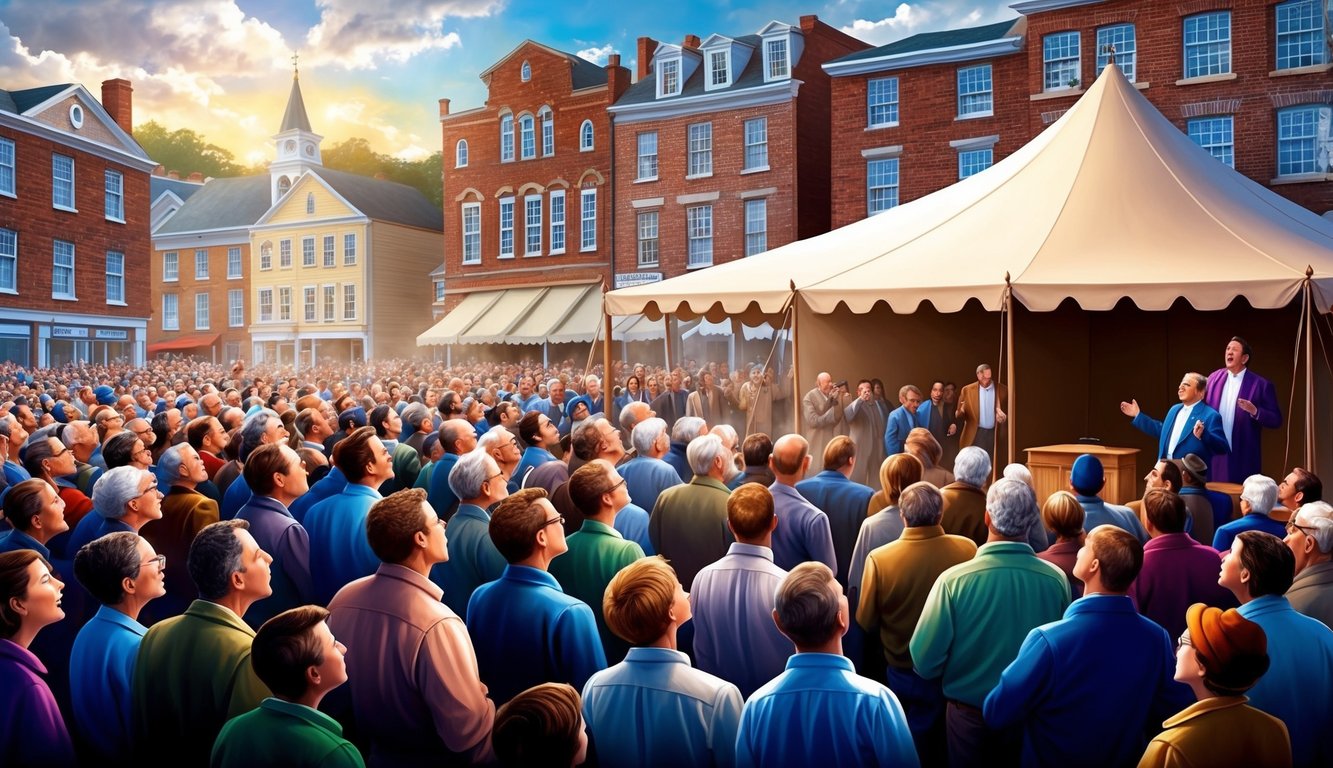Don’t Miss Out On This Unique Astrological Opportunity
Are you tired of spinning your wheels and getting nowhere? Simply put, you’re out of sync: you’re out of alignment with your astral configuration.
But: there’s a kind of map that can help you reclaim your alignment. Think of it as your own personal blueprint to success and happiness: a blueprint that will help you live your most amazing life.
Get started here.
When you hear the word “revival,” you might think about bringing something back to life.
In a Christian context, revival is an awakening or renewed interest in faith and spirituality.
It often involves a personal or community-wide rediscovery of deep, spiritual truths, leading to a stronger connection with God.
This can happen in different ways, such as through prayer meetings, church services, or personal reflection.
In history, revivals have played significant roles in reshaping faith communities.
For example, revivals have led to a return to fundamental beliefs and practices.
This rekindling of faith can feel like starting a fire from embers that were slowly dying.
Sometimes, a revival spreads across an entire region or even involves different groups coming together.
In today’s world, the concept of spiritual revival can still hold great meaning and impact.
Have you ever wondered where you can find revival happening right now? This idea continues to spark interest among those seeking a deeper understanding of their faith.
Through community gatherings or personal journeys, many people are reviving their spiritual lives and finding renewed purpose in their beliefs.
This resurgence often takes place in churches, small groups, or even through online communities where individuals share their experiences.
Many have witnessed miracle stories that inspire hope, encouraging others to seek their own moments of transformation.
As people come together in faith, they find strength, renewal, and a deeper connection to their spiritual journey.
Historical Context of Revivals

Revivals have played a significant role in shaping religious landscapes, especially throughout Christian history.
They often bring about spiritual renewal and societal change.
This section explores important revivals and their impacts on history.
Defining Moments in Revival History
Several key events define the history of revivals.
One notable period is the First Great Awakening in the 18th century, which spread across the American colonies, emphasizing personal faith and direct connections with God.
This movement led to increased church memberships and the formation of new denominations.
The Second Great Awakening followed in the 19th century, focusing on social reforms, including abolition and women’s suffrage.
During this time, camp meetings became popular and brought together large gatherings for worship and preaching.
The Great Awakening periods changed the way people viewed their personal role in faith, empowering individuals to take part in religious discussions.
These awakenings also challenged the existing church structures, pushing for inclusion and reform.
Impact of the Great Awakenings
The Great Awakenings impacted church communities significantly.
During the First Great Awakening, emphasis on personal piety encouraged believers to experience a personal connection with God, reshaping churches to be more emotionally engaging.
Evangelical fervor during the Second Great Awakening led to widespread conversions and increased church activities.
These movements also inspired various social reforms.
The revivals addressed pressing social issues, such as education and abolition, by fueling movements that stemmed from Christian morals.
This allowed churches to become hubs for social change, strengthening community bonds and outreach initiatives.
Enthusiasm from these awakenings fostered a spirit of hope and renewal, driving both religious and societal transformation.
The Role of Individuals and Society

Individuals and society both play crucial roles in revival movements.
Key figures often lead these movements with strong influence, while communities and church congregations provide necessary support and involvement.
Notable Figures in Revival Movements
In many revival movements, notable figures like Paul and David have been pivotal.
These individuals are often seen as leaders or catalysts, sparking renewed faith among believers.
Their influence can inspire others, drawing on teachings and actions from Biblical times.
Such figures, including ministers or local leaders, often serve as examples of faith.
They motivate church congregations to embrace change and deepen their belief systems.
Understanding the roles these individuals play helps us appreciate how personal conviction can impact society, encouraging participation and commitment.
Community and Church Involvement
Community and church involvement is essential for a successful revival.
Congregations provide the structure and support needed to sustain these movements.
When men, women, and children in a church work together, their combined efforts create a strong foundation for revival.
Churches often organize events, prayer meetings, and gatherings to involve everyone in the process.
This unity helps strengthen the bonds within the church and extends to society, encouraging moral and spiritual growth.
Your participation as part of your community can make a significant difference in revitalizing faith and spreading positive change.
Spiritual and Theological Foundations

In exploring the concept of revival, it’s crucial to understand the spiritual and theological underpinnings that shape its framework.
These foundations highlight the role of scripture, personal faith, and the Holy Spirit in reviving the heart and soul.
Core Biblical Principles
Revival is deeply rooted in biblical teachings and draws from key texts such as Psalm 85:6 and Isaiah 57:15.
These passages emphasize God’s desire to breathe new life into His people.
The Bible provides numerous examples where God revives His followers through spiritual awakenings.
Scripture consistently points to repentance and salvation as central to experiencing revival.
The New Testament, particularly in books like Hebrews, underscores the importance of faith and perseverance.
You’ll find that Jesus often calls for personal transformation, urging believers to renew their spiritual lives and strengthen their faith.
Through the guidance of the Holy Spirit, your journey towards revival reflects a deeper commitment to following Christ and His teachings.
The Importance of Personal Faith
Your personal faith plays a significant role in the process of revival.
Revival is not just a collective experience, but one that begins with the transformation of the heart.
It involves renewing your commitment to Jesus and deepening your relationship with God.
Personal faith cultivates a responsive and humble spirit ready for spiritual growth.
As highlighted in various theological discussions, genuine revival emerges when individuals open themselves to the workings of the Holy Spirit.
This personal revival is marked by a sincere and dedicated pursuit of godliness, aligning your life more closely with biblical principles.
Your faith journey can lead to a greater impact within your community and church, fostering a broader movement towards spiritual renewal.
Practical Aspects of Revival
In reviving spiritual and religious enthusiasm, focus on conducting meaningful meetings and engaging music is key.
These elements work together to create an atmosphere of reflection and renewal.
Conducting Revival Meetings
You can start by planning evangelistic meetings that welcome everyone from your community.
It’s important to create a warm and inviting environment where people feel comfortable to share and express themselves.
At these gatherings, the goal is to encourage repentance and confession.
Having a skilled speaker who can deliver the gospel with clarity can make a big impact.
Preaching plays a central role.
Choose topics that resonate with everyday experiences and spiritual needs.
Invite participants to join prayer groups for personal reflection and connection.
The power of collective prayer often deepens personal conviction and brings a sense of unity and purpose.
Music and Worship in Revivals
Music sets the tone for your revival meetings.
Incorporating singing can be a powerful way to engage participants.
Select songs that inspire and uplift, often focusing on themes of renewal and hope.
Hymns and contemporary worship songs create an emotional backdrop that enhances the spiritual message.
Consider forming a music team or choir to lead worship.
This gives the congregation a chance to participate actively, deepening their involvement.
Prepare song lists that align with the meeting’s themes.
Quality musicianship helps to maintain the flow and emotion of the service.
Encouraging everyone to join in singing helps make the worship feel dynamic and inclusive.
Outcomes and Effects of Revival
Exploring the impact of revivals, you can see both personal transformations and broader societal changes.
They can lead to renewed individual spiritual awakenings and shifts in cultural norms and practices.
Transformations in Individual Lives
During a revival, many people experience significant spiritual awakenings.
You might witness individuals becoming born again in their faith, feeling a newfound commitment to God.
This personal renewal often brings a strong sense of purpose and spiritual fervor.
People report feeling the fullness of God in their lives, often accompanied by powerful experiences involving the Holy Spirit.
Significant changes, like increased involvement in missions or church activities, reflect this renewed dedication.
These individual transformations can deeply affect family dynamics and friendships, bringing a sense of restoration and hope.
Revival’s Influence on Society and Culture
Revivals not only touch individual lives but also influence entire communities.
They often encourage a collective commitment to moral and ethical standards, impacting social norms.
During these periods, you might notice increased charity and community service as people act on their faith-driven values.
Cultural practices can shift as revivals foster a focus on spiritual renewal and shared beliefs.
This influence might be seen in art, music, and even policy changes inspired by religious principles.
The societal effects of a revival can lead to more cohesive and supportive communities, striving for collective well-being and reflection of spiritual aspirations.
This transformation underscores the broader power of religious and spiritual movements.



